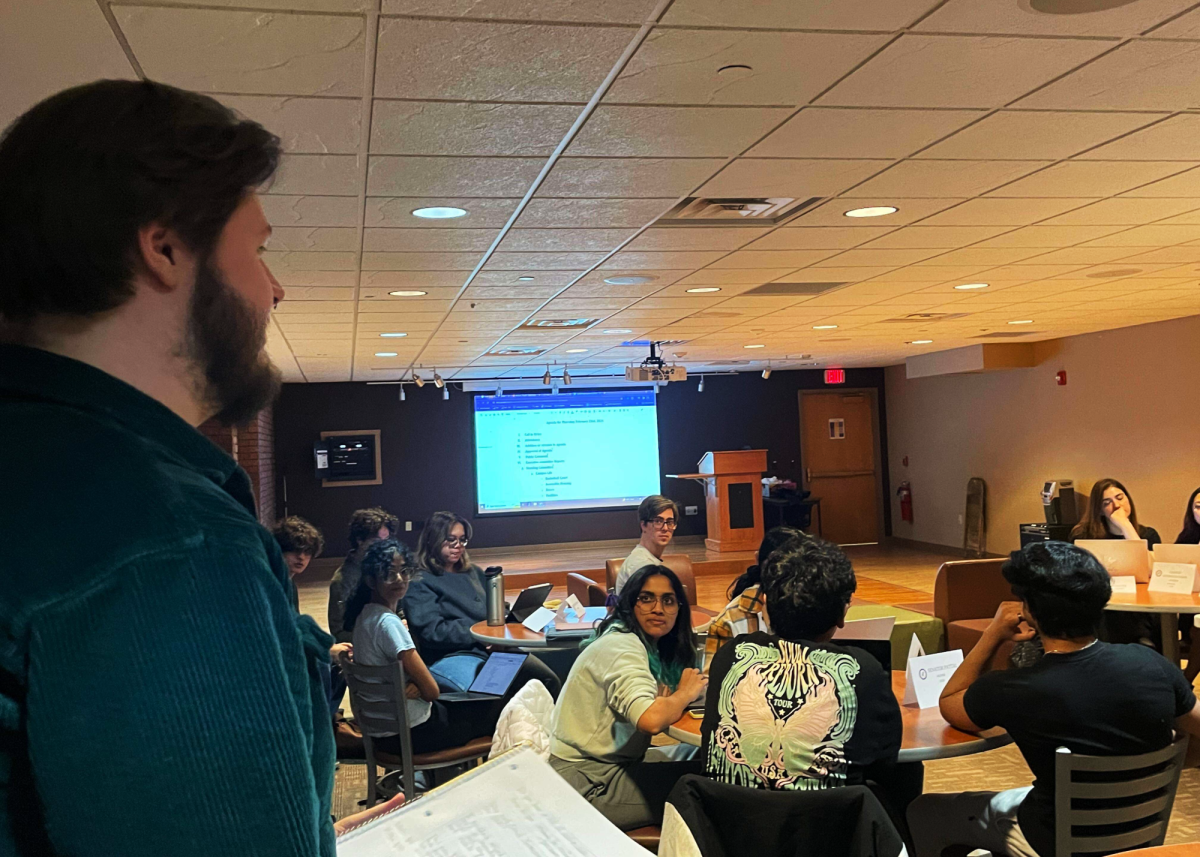 On most Saturday nights in Galesburg, you can expect to find Knox College students gathering, listening to music, watching movies, playing games. Some may attend social events at the fraternities, or walk down to Cherry St. Bar. In the fall and spring, and even in the summer, you’ll find us outside, lounging in the grass, in hammocks, walking around campus. Social life is essential here, as it is essential to any college student. In the dead of winter, though, when the temperature is below zero, you won’t find any students outside. Instead, we retreat to our rooms. We prioritize warmth and comfort over the excitement and opportunity of a night out. On those nights, when the snow is piled to your calves and the frigid wind bites though your puffer jacket, you’ll find, more often than not, groups of students smoking in their rooms. Vapes, cigarettes, joints, and dab pens alike, smoke huffs and puffs out the windows and into the wintry night air.
On most Saturday nights in Galesburg, you can expect to find Knox College students gathering, listening to music, watching movies, playing games. Some may attend social events at the fraternities, or walk down to Cherry St. Bar. In the fall and spring, and even in the summer, you’ll find us outside, lounging in the grass, in hammocks, walking around campus. Social life is essential here, as it is essential to any college student. In the dead of winter, though, when the temperature is below zero, you won’t find any students outside. Instead, we retreat to our rooms. We prioritize warmth and comfort over the excitement and opportunity of a night out. On those nights, when the snow is piled to your calves and the frigid wind bites though your puffer jacket, you’ll find, more often than not, groups of students smoking in their rooms. Vapes, cigarettes, joints, and dab pens alike, smoke huffs and puffs out the windows and into the wintry night air.
The smoke-free by 2025 policy will only exasperate this issue. Smoking inside, as we all know through common sense, presents issues in fire safety, secondhand smoke, smoke residue, and more. The policy, meant to combat the habit of smoking, will not end smoking on campus because college students who want to smoke are going to find a way to smoke. They will walk off campus, sit in their cars, or smoke in their rooms. What concerns me most about this policy is the repercussions that will come from students smoking in their rooms. The smoke, the smell of it, travels through air vents in the building. It affects not only other students in the building, but their pets, their belongings, the overall cleanliness of the building. I am not anti-smoke free. We all know smoking has horrible consequences for your health. But I am concerned that this policy will not have the effect on smoking that Knox’s administration hopes it will, and I wonder if there is a better way to combat smoking than banning it outright.
Jenna Schweikert – Editor-in-Chief in-training

The intention behind this policy is positive and obviously we are invested in the health and wellbeing of the Knox community. However, our students are adults, and those who are old enough to smoke should be able to make that decision for themself.
Students who live on campus already have little autonomy in many decisions about their lives. They are unable to completely control where they live and who they live with. They also must be on a meal plan, meaning they cannot choose what they eat. Even if it has a negative effect on their health, community members should be able to choose if they smoke.
Selah Dow – Copy Editor
 While a smoke-free campus may have negative impacts on students’ lives, students are not the only people affected by the ban. People that come from off campus to work will have to adhere to the ban as well. This means that faculty and staff will no longer be able to take smoke breaks while at work. Cigarette smoking on breaks is widely practiced in a wide range of professions. According to the National Institute of Health, as of 2021, 18.7 percent of US adults use nicotine products with cigarettes and e-cigarettes as the major products used. This means that around 18.7 percent of adults on campus use nicotine products, which under current policy must be used at least 10-15 feet away from building entrances.
While a smoke-free campus may have negative impacts on students’ lives, students are not the only people affected by the ban. People that come from off campus to work will have to adhere to the ban as well. This means that faculty and staff will no longer be able to take smoke breaks while at work. Cigarette smoking on breaks is widely practiced in a wide range of professions. According to the National Institute of Health, as of 2021, 18.7 percent of US adults use nicotine products with cigarettes and e-cigarettes as the major products used. This means that around 18.7 percent of adults on campus use nicotine products, which under current policy must be used at least 10-15 feet away from building entrances.
This policy will negatively affect the quality of life of workers on campus. While there are no laws to require employers to allow cigarette smoking on work breaks, in food service culture specifically it is a common practice. According to the Center for Disease Control, roughly 26.8% of food service workers use nicotine products. Regardless of one’s profession on campus, they should be allowed the comfort of being able to smoke outdoors on campus during their breaks.
Ellen/Kilroy Miller-Garrett – Managing Editor
 The new Smoke Free by 2025 policy in theory would help cut down the number of students who smoke indoors and cause problems for both fellow suitemates and campus life cleaning bills. However, the implications of the new policy and enforcement of it will likely be less than promising. Smoking at Knox, specifically smoking indoors is a major problem. Everyone is deeply familiar with the, ‘sweet smells of Seymour Union,’ that happen like clockwork at 4 pm. But it causes more problems than being a mild inconvenience for those who don’t enjoy the smell of smoke – it’s a legitimate medical problem for students who have asthma, or get migraines in the presence of strong smells. Not only that but smoke, regardless of source, is still bad for your lungs and your general health. Students who aren’t smokers shouldn’t have to live with smoke inside their living spaces.
The new Smoke Free by 2025 policy in theory would help cut down the number of students who smoke indoors and cause problems for both fellow suitemates and campus life cleaning bills. However, the implications of the new policy and enforcement of it will likely be less than promising. Smoking at Knox, specifically smoking indoors is a major problem. Everyone is deeply familiar with the, ‘sweet smells of Seymour Union,’ that happen like clockwork at 4 pm. But it causes more problems than being a mild inconvenience for those who don’t enjoy the smell of smoke – it’s a legitimate medical problem for students who have asthma, or get migraines in the presence of strong smells. Not only that but smoke, regardless of source, is still bad for your lungs and your general health. Students who aren’t smokers shouldn’t have to live with smoke inside their living spaces.
These are all things that would improve greatly if Knox was smoke free. However Knox administration often fails at upholding policies that affect the residential aspect of campus. Knox, like most colleges, rely heavily on Resident Assistants and Duty RAs to uphold policies and report violations that happen on campus. That enforcement is faulty at best, with little to no return on long term effect on the rates of students smoking. As an RA – there are already extreme levels of pressure and difficulty to the job to enforce policy on residents in a way that does not completely burn them from building community. Many RAs already struggle with getting students to not smoke indoors, and a smoke free policy for the entire campus would inevitably fall onto already overworked students to uphold.
Red Engel – Graphics Editor




